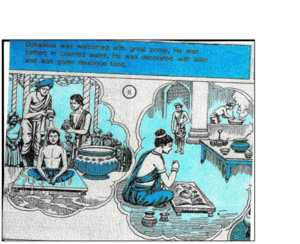Talk:The Jnānī worshipper: The Knowledgeable Worshipper
By Vishal Agarwal
Linda Johnsen describes this worshipper as follows –
“The final type is the one who loves God for God’s sake alone. God is just so lovable! There’s no ulterior motive. There’s just love. Kṛṣṇa says he’s delighted to accept the prayers of each kind of devotee. But the soul who delights him most is the one who comes to him out of pure, unselfish devotion.”
"In the Bhagavad Gītā, Kṛṣṇa says: Of these, the wise worshipper, who is always established in yog, and who is always devoted to Me, is the best; because I am extremely dear to the wise worshipper, and he is also very dear to me.Gītā 7.17" "All these four worshippers are noble indeed, but I consider the wise worshipper as my very self (or a part of Me). This is because his soul is steadfast in yog and he pursues Me alone as his highest goal.Gītā 7.18" At the end of several lives,[1] the wise worshipper finally finds refuge in Me, realizing that Vāsudeva is all this. Such a great soul is very difficult to find indeed.Gītā 7.19"
A guru explains –
One Kacchiyā [from Kutch in western India] devotee, a greengrocer by profession, came to Mumbai. It was his first visit to this famed city of wealth and luxury. He decided to spend three days sightseeing. He was asked, “Have you seen the city?”
“Yes,” he said.
“What did you see?”
“In the Byculla market (Mumbai), I saw great heaps of vegetables. Tons and tons of vegetables. Gosh! My God! A mountain of vegetables!” the devotee replied. There are lots of places and things to see in Mumbai. But the greengrocer saw only the vegetables. We all choose to see only what we are interested in. Similarly, he whose mind is attached to God, and delights in God, sees nothing else but God.”[2]
Other scriptures too declare:
Śiva said: "Amongst all my bhaktas, he is dearest to me who worships me through jñāna, and not through any other means (or motives).Kūrma Purāṇa, Uttarārdha 4.25" "It is true that the Lord grants the fulfillment of their prayers to those votaries who approach Him with worldly desires. But by this He does not bestow on them the real fulfillment; for it is found that when one desire is satisfied, they approach Him with new desires. But in regard to those who worship Him without any desire (i.e., with pure love), He, out of His own accord, bestows on them His grace, which roots out all wants.Bhāgavata Purāṇa 5.19.27"
The distinction of the jñānī-bhakta (practitioner of bhakti-yog or parā-bhakti) from the first three types of bhaktas is described as follows:
“The common characteristic of these three types is that their bhakti is an instrumental or utilitarian value. Love of God, if we may so describe even this interest in God, is nothing undivided and nothing abiding. The devotee is after the other ends to which he is attached and he happens to be attached to God as a means thereof. He has no undivided inclination towards God. As God is just a means, after the related ends are realized, the means cease to be of value and hence bhakti in these types is no abiding passion.
Contrasted with these types of devotion is the devotion of an enlightened seeker of God to whom God is both the means and ends and he seeks from God only the blessedness of attaining Him. This is absolute and undivided love and it cannot pass away, for it constitutes an intrinsic value. This type of devotee is aptly described as ekabhakta (devoted to only one) and nityayukta (ever steadfast). He is a man of knowledge according to the Gītā because he has adopted God both as the means and the end.
Such a total and abiding valuation of God seems to be the distinguishing essence of knowledge in the context. It is the enlightenment that seeks to realize God as the absolute value through the unfailing efficacy of Divine grace.”[3]
Story: The Focus and Concentration of Śukadeva[edit]
Vyāsa was the greatest ṛṣi of his time. He lived in Kurukṣetra, northern India, and in Bādarikāśrama in the Himalayas. He had a son named Śukadeva, who showed great spiritual advancement even as a child and a teenager.
Once, Vyāsa sent his son to study under King Janaka of Videha, who was renowned for his spiritual wisdom and knowledge. Śukadeva traveled almost 1000 km by foot from his father’s home to listen to the sermons in Videha. King Janaka, through his spiritual powers, learned beforehand that Vyāsa’s son was coming to study under him, and he made preparations accordingly.
When Śukadeva reached the palace, the guards (as instructed) hardly paid any attention to him. They allowed him into the assembly of the King, where he was offered a seat. For three days, King Janaka gave a sermon on Hindu spirituality. Śukadeva also listened intently, but no one paid attention to him even though he was the son of a great ṛṣi.
From the fourth day onwards, however, things changed completely. The royal courtiers and officials gave Śukadeva a grand reception and welcomed him with pricey clothing, jewels, and requested him to a lavish room for his stay. The teenager Śukadeva lived in his new lavish surroundings for 8 days.
Janaka had asked his servants to keep a watch on Śukadeva during all of the 11 days. The servants reported, “King, Śukadeva remained calm and composed throughout the time. He never showed any anger or frustration the first three days when no one paid any attention to him. And in the following 8 days, he showed no joy or excitement when we showered him with presents and attention and catered to each one of his needs.”
King Janaka then sent a request to Śukadeva to come to the royal court for a meeting. When Śukadeva appeared, the king was seated on his magnificent throne. Beautiful girls danced all around to keep everyone entertained. Janaka said to Śukadeva, “I am offering you a bowl of milk filled to the brim. I want you to place this bowl on your head, and make seven rounds inside the room around all of us. If you do not spill a single drop, then alone I will offer to teach you my wisdom.”
Śukadeva placed the bowl on his head cheerfully. While he walked around the room, the dancing girls continued with their song and dance. The crowd gathered in the room was talking loudly and paying attention to what the boy was doing. But Śukadeva did not get distracted by anything and successfully walked around the room 7 times without getting distracted by the dancing girls, the music, the richly dressed courtiers, the comments of other onlookers, or the worry that he would not succeed.
When the King saw Śukadeva finish this feat remarkably, he said, “Dear boy, there is nothing that I need to teach you. You do not feel insulted or frustrated when people ignore you or give you no importance. You do not feel excited when you are surrounded by beautiful clothes, jewels, music, dance, etc. This is the main quality that a person needs to have to advance spiritually. And in fact, only a spiritually advanced person can show this kind of equipoise and concentration. You have renounced mentally all attachments, attractions, and aversions. Therefore, you do not need to study under me.”[4]
Janaka was correct indeed, because Śukadeva became renowned as a great ṛṣi in his own right, and became the narrator of the Śrīmad Bhāgavata Purāṇa to King Parīkṣit later. Śukadeva attained mokṣa in his father Vyāsa’s own lifetime.
References[edit]
- ↑ At the end of several lives: This does not mean that the wise worshipper is reborn many times even after attaining wisdom and knowledge before he finds refuge in the Lord. Rather, it means that the wise worshipper has undergone many births in ignorance and now after becoming wise, his current life becomes his last mortal existence. If at all the fully wise and enlightened worshipper is reborn, it is due to prārabdha-karm, upon the exhaustion of which he attains mokṣa.
- ↑ Yogiji Mahārāja. 101 Tales of Wisdom as Told by Yogiji Mahārāja. Ahmedabad: Swāminārāyaṇa Akṣarapīṭha, 2015, p. 63.
- ↑ Raghavachar, S. The Philosophy of Bhakti and the Significance of Hindu Image-Worship. Kolkata: Ramakrishna Mission’s Institute of Culture, 2000, p. 17.
- ↑ Source: Yogavāsiṣṭha Mahārāmāyaṇa


